
International Journal of Limnology
Scope & Guideline
Unveiling the Mysteries of Limnology
Introduction
Aims and Scopes
- Freshwater Fish Ecology:
Research surrounding the population dynamics, reproductive behaviors, and community interactions of freshwater fish species, particularly coregonines and other economically important species. - Aquatic Invertebrates and Macroinvertebrate Communities:
Studies examining the diversity, distribution, and ecological roles of aquatic invertebrates, including crustaceans and insects, in various freshwater habitats. - Water Quality and Pollution Impact Studies:
Investigations into the effects of pollution, particularly from urban and agricultural sources, on the health of freshwater ecosystems and the organisms that inhabit them. - Ecosystem Management and Restoration:
Research focused on management strategies and restoration techniques aimed at improving and sustaining the health of freshwater ecosystems. - Microbial Ecology and Ecosystem Functioning:
Exploration of microbial communities in freshwater environments, their diversity, and their roles in nutrient cycling and ecosystem processes. - Impact of Climate Change on Freshwater Systems:
Studies assessing how changing climatic conditions affect freshwater biodiversity, ecosystem services, and habitat dynamics.
Trending and Emerging
- Impacts of Climate Change on Freshwater Biodiversity:
Recent publications are increasingly focusing on how climate change influences the reproductive phenology and population dynamics of freshwater species, highlighting the urgency of understanding these impacts for conservation efforts. - Socio-economic Aspects of Aquatic Resource Management:
There is a noticeable trend towards integrating socio-economic assessments with ecological studies, as seen in research evaluating the socio-economic impacts of fisheries rehabilitation and management efforts. - Technological Advancements in Ecological Monitoring:
The use of advanced technologies such as acoustic telemetry and genetic barcoding is on the rise, facilitating more precise studies on species behavior and community composition in freshwater systems. - Microplastic Pollution and Its Effects:
Emerging research is increasingly addressing the impact of microplastics on freshwater ecosystems, reflecting a growing concern about pollution and its implications for aquatic life. - Community-Based Conservation Approaches:
Recent studies are beginning to incorporate Indigenous ecological knowledge and community engagement in freshwater management, emphasizing the importance of local perspectives in conservation strategies.
Declining or Waning
- Tropical and Subtropical Freshwater Studies:
Research focused on tropical and subtropical freshwater ecosystems has seen a reduction in frequency, possibly indicating a shift towards temperate ecosystems, which may be receiving more attention in recent publications. - Traditional Taxonomic Studies:
There seems to be a decline in papers solely focused on traditional taxonomy of aquatic species, as the journal shifts towards more integrative approaches that combine genetics, ecology, and conservation. - Historical Limnology:
Studies that focus on the historical aspects of freshwater ecosystems, such as historical biogeography or long-term ecological changes, appear to be less frequent, possibly overshadowed by contemporary ecological assessments.
Similar Journals
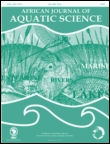
AFRICAN JOURNAL OF AQUATIC SCIENCE
Fostering dialogue in the realm of aquatic science.AFRICAN JOURNAL OF AQUATIC SCIENCE, published by TAYLOR & FRANCIS LTD, is a premier scholarly journal dedicated to the field of aquatic science, ecology, and environmental management, playing a crucial role in advancing research and knowledge in these vital areas. With an impressive Q2 ranking in both Aquatic Science and Ecology, Evolution, Behavior and Systematics, the journal seeks to publish high-quality research encompassing a wide range of topics related to freshwater and marine ecosystems, including biodiversity, conservation strategies, and the impacts of climate change. Featuring a rich history of publication from 2000 to 2024, the journal not only embraces rigorous peer review but also aims to foster collaboration and dialogue among researchers, practitioners, and students interested in aquatic environments. Readers will find that the journal’s commitment to impactful scientific communication is reflected in its notable rankings within the Scopus database, making it an essential resource for those engaged in aquatic research and management.
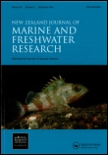
NEW ZEALAND JOURNAL OF MARINE AND FRESHWATER RESEARCH
Unveiling the Secrets of New Zealand's WatersNEW ZEALAND JOURNAL OF MARINE AND FRESHWATER RESEARCH, published by Taylor & Francis Ltd, stands as a distinguished platform for the dissemination of innovative research in the realms of aquatic science and ecology. With an ISSN of 0028-8330 and E-ISSN 1175-8805, this journal has been curating significant scientific contributions since its inception in 1967, continuing through to 2024. Recognized in the Q2 category across multiple relevant fields—including Aquatic Science, Ecology, and Water Science—this journal ranks notably in Scopus, with a 74th percentile for Ecology, Evolution, Behavior and Systematics, highlighting its impact and relevance within the scientific community. Though not an open-access publication, its rigorous peer-reviewed articles offer insights that resonate with researchers, professionals, and students who are passionate about advancing our understanding of freshwater and marine ecosystems. By fostering a collaborative space for ecological and environmental inquiries, the NEW ZEALAND JOURNAL OF MARINE AND FRESHWATER RESEARCH is essential for those aiming to contribute to the vital conversations around biodiversity, conservation, and sustainable management of aquatic resources.
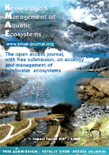
Knowledge and Management of Aquatic Ecosystems
Advancing Solutions for Sustainable Aquatic EcosystemsKnowledge and Management of Aquatic Ecosystems, published by EDP SCIENCES S A, is a premier open-access journal dedicated to the interdisciplinary study of aquatic ecosystems. With an ISSN of 1961-9502 and an impressive history since 1928, this journal serves as a vital resource for researchers and professionals in the fields of Ecology, Aquatic Science, Water Science and Technology, and Nature Conservation. The journal has consistently achieved high rankings, including a Q2 classification in multiple categories, which underscores its significant contribution to the evolving landscape of aquatic research. With access options that promote widespread dissemination of knowledge, Knowledge and Management of Aquatic Ecosystems aims to bridge gaps in research, policy, and practical applications, making it an invaluable asset for students, researchers, and policymakers aiming for impactful solutions in aquatic management and conservation.
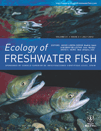
ECOLOGY OF FRESHWATER FISH
Illuminating the science of aquatic life.ECOLOGY OF FRESHWATER FISH is a premier academic journal dedicated to advancing the understanding of freshwater fish ecology, published by Wiley in Denmark. With an ISSN of 0906-6691 and an E-ISSN of 1600-0633, the journal has been a critical platform for researchers since its inception in 1992, and will continue through 2024. It holds an impressive Q2 ranking in multiple categories including Aquatic Science and Ecology according to the latest quartiles, reflecting its significance and impact in these fields. The journal is well-regarded with Scopus rankings placing it in the top percentiles for ecology-related disciplines, showcasing its contributions to the understanding of aquatic ecosystems. Although it does not offer open access, the journal is highly valued for its rigorous peer-review process and its commitment to publishing original research that informs policy and conservation efforts. By bridging the gap between theory and practice, ECOLOGY OF FRESHWATER FISH remains a vital resource for students, professionals, and researchers engaged in the study of freshwater environments.

LIMNOLOGY AND OCEANOGRAPHY-METHODS
Pioneering methods for a sustainable aquatic future.LIMNOLOGY AND OCEANOGRAPHY-METHODS is a premier journal published by WILEY, dedicated to advancing the understanding of methodologies in limnology and oceanography. With an ISSN of 1541-5856, this esteemed publication has established itself within the academic community, holding a solid Impact Factor and proudly ranking in the Q1 category for Ocean Engineering according to 2023 metrics. The journal, which has been converged since 2003, encompasses a broad scope that includes innovative techniques and applications essential for aquatic research and environmental monitoring. As a leader in the field, it is ranked #32 out of 105 journals in Ocean Engineering, placing it within the 70th percentile of its category. While it operates under subscription access, LIMNOLOGY AND OCEANOGRAPHY-METHODS serves as an invaluable resource for researchers, professionals, and students alike, providing critical insights that drive advancements in aquatic sciences.

LAKE AND RESERVOIR MANAGEMENT
Fostering interdisciplinary collaboration for better water management.LAKE AND RESERVOIR MANAGEMENT is a premier academic journal published by Taylor & Francis Inc, providing a dedicated platform for the dissemination of high-quality research and innovations in the field of aquatic management. With an ISSN of 1040-2381 and an E-ISSN of 2151-5530, the journal encompasses a broad spectrum of topics related to the sustainable management and ecological assessment of lakes and reservoirs. As an essential resource for researchers, professionals, and students involved in environmental science, hydrology, and water resource management, the journal aims to address critical issues such as water quality, ecosystem services, and the impact of human activities on aquatic systems. Additionally, the journal promotes interdisciplinary approaches that foster collaborative solutions for effective management of aquatic resources. Although it currently does not offer open access, LAKE AND RESERVOIR MANAGEMENT remains influential in shaping policies and practices within the field, making it a vital read for anyone dedicated to advancing knowledge and practice in aquatic ecosystem management.

ECOLOGICAL RESEARCH
Unraveling the mysteries of nature with cutting-edge research.ECOLOGICAL RESEARCH is a prestigious academic journal published by WILEY, dedicated to advancing the field of ecology and its associated disciplines. Since its inception in 1986, the journal has consistently provided a platform for high-quality, peer-reviewed research, contributing significantly to the understanding of ecological systems and their complexities. With an impressive 2023 impact factor reflected in its Q1 ranking in the category of Ecology, Evolution, Behavior, and Systematics, it stands among the top journals in its field, as evidenced by its Scopus rank of #192 out of 721 and placement in the 73rd percentile. While accessible through standard subscription models, this journal plays an essential role in disseminating crucial findings and innovative methodologies to researchers, professionals, and students alike. With a commitment to fostering ecological knowledge and collaboration, ECOLOGICAL RESEARCH continues to influence ecological practices and policies, shaping the future of research in this critical area.

LIMNOLOGY
Unveiling the Secrets of Freshwater SystemsLIMNOLOGY, published by SPRINGER JAPAN KK, serves as a premier platform for the dissemination of high-quality research in the fields of aquatic science, ecology, and water science and technology. With an ISSN of 1439-8621 and an E-ISSN of 1439-863X, this respected journal has consistently maintained a Q2 ranking in its respective categories as of 2023, reflecting its impact and relevance in the academic community. Operating from its base in Tokyo, Japan, LIMNOLOGY engages a diverse audience of researchers, professionals, and students who are focused on advancing knowledge related to freshwater systems and their ecological health. This journal covers a wide range of topics within its scope from the year 2000 to 2024, highlighting essential studies that contribute to both theoretical and applied aspects of limnology. Although this journal is not open access, its rigorous peer-reviewed articles are crucial for driving innovation and fostering dialogue among scientists and environmentalists dedicated to understanding and preserving water ecosystems.

MARINE AND FRESHWATER RESEARCH
Unveiling the mysteries of our waters.Marine and Freshwater Research is a prestigious journal published by CSIRO PUBLISHING that serves as a key platform for the dissemination of cutting-edge research in the fields of Aquatic Science, Ecology, and Oceanography. With an impactful presence since its inception in 1948, the journal provides critical insights into the dynamics of freshwater and marine ecosystems, promoting interdisciplinary approaches that contribute to our understanding of biodiversity and sustainability. Currently ranked in the Q2 category across major scientific domains, including Ecology and Aquatic Science, it enjoys a robust academic reputation supported by impressive Scopus rankings, such as Rank #66/247 in Aquatic Science and Rank #44/145 in Oceanography, reflecting its high citation impact and relevance. While offering a subscription-based access model, the journal remains dedicated to fostering dialogue and innovation within the scientific community, aiming to bridge the gap between research findings and practical applications in environmental management. Located in Australia, Marine and Freshwater Research is an essential resource for researchers, professionals, and students dedicated to exploring the complexities of aquatic ecosystems and advocating for their preservation.
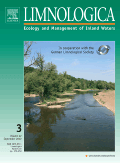
LIMNOLOGICA
Advancing Knowledge in Freshwater EcosystemsLIMNOLOGICA is a prestigious academic journal dedicated to the field of aquatic sciences, published by Elsevier GmbH, a leading global publisher known for its commitment to disseminating high-quality research. With an ISSN of 0075-9511 and an E-ISSN of 1873-5851, the journal has established itself as a vital source of scholarly articles, reviews, and case studies since its inception in 1974. Operating from its base in Munich, Germany, LIMNOLOGICA provides a forum for researchers and professionals to explore contemporary issues in limnology, ensuring important contributions to the understanding of freshwater ecosystems. Recognized in the 2023 rankings, the journal boasts a respectable Q2 quartile in Aquatic Science, ranking #98 out of 247 in Scopus, placing it in the 60th percentile among its peers. While currently not an open-access journal, it continues to attract a wide readership by providing insights into ecological processes, conservation strategies, and the impacts of anthropogenic changes on freshwater environments. This makes LIMNOLOGICA an essential resource for anyone engaged in aquatic research, conservation efforts, and environmental policy development.